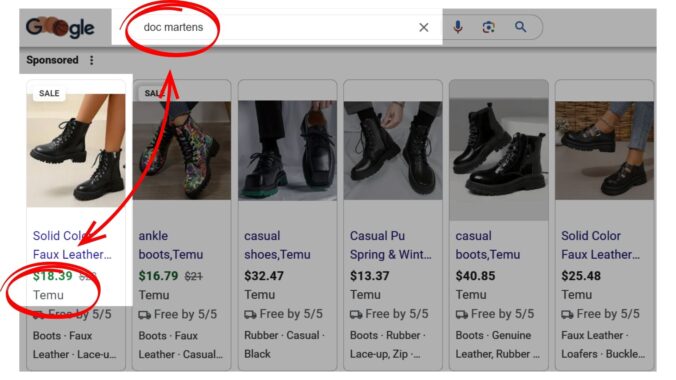There has been a lot of controversy over Temu, Shein, and intellectual property laws. There are numerous reports of brands and independent designers claiming the Chinese giants have stolen their designs to sell similar lower-priced items online.
Recently, the footwear brand Dr. Martens is suing Temu for another reason. Dr. Martens claims Temu is manipulating Google searches to display their product alongside Dr. Martens shoes.
I am not an IP lawyer, but I have some difficulties seeing how this lawsuit stands a chance. While there might be some IP issues with Temu, I don’t see this lawsuit going very far, and I’d like to review it from an e-commerce professional point of view. Now, if you are a lawyer, I’d love to hear your opinion as I may miss important details that require extensive knowledge of IP laws.
What Are Branded Keywords in Advertising?
The iconic British brand claims that Temu uses its brand in Google ads keywords, such as “Doc Martens” or “Airwair”, so that Temu’s cheap boots appear above its own in the search results. Let’s clarify what this means. The ads displayed by Temu do not feature words related to Dr. Martens explicitly. It is when a user searches for “Doc Martens” on Google that ads for Temu may appear, next to the brand’s own products. The ads for Temu’s products display the product as “Ankle boots” or “Faux leather boots”.
While Google prohibits ads that infringe on trademark rights, it does allow advertisers to use branded keywords. Using branded keywords is a very common practice in e-commerce. When you search for “Geico” on Google, it is very likely that the first result you will actually see will be an ad for State Farm or another of its competitors. As a marketer, you know that there is a chance the person searching for Geico is shopping around for new car insurance and isn’t looking specifically for Geico. In the world of Amazon ads, there is a feature called ASIN targeting that allows brands to design ads targeting specific products, including their competitors.
Furthermore, it isn’t clear who is behind these ads for Temu. Temu acts as a storefront for companies that sell their own products. It would be difficult to track who posted these ads, in the case it was established that using branded keywords is violating IP laws.
Does Using Branded Keywords Constitute Trademark Infringement?
First, let’s take a look at what actually constitutes trademark infringement. According to a document posted on Harvard’s overview of Trademark Law, “the use of a trademark in connection with the sale of a good constitutes infringement if it is likely to cause consumer confusion as to the source of those goods or as to the sponsorship or approval of such goods.”
I personally fail to see how using branded keywords in search ads causes consumer confusion. While Temu’s products are similar to Dr. Martens in the sense that these are the same product category, none of these ads feature explicitly Dr. Martens’ trademarked names. The products look different, have different claims (it is clear that these items are made of different materials), and are sold at very different price points. The way I see it is that a customer looking for black boots will search for “Doc Martens” because that is the first name that will come to their mind, but could potentially be interested in cheaper, different boots. But that is just my personal opinion, so let’s take a look at previous cases.
Back in 2016, the FTC filed a complaint against 1-800 Contacts, the largest online contact lens retailer in the US. The FTC challenged agreements between the company and 14 of its competitors preventing them from using the keyword “1-800 Contacts” in their search ads campaigns. The agency claimed that these agreements limited competition and reduced the number of relevant and unambiguous ads for consumers. According to the American Bar Association, “The FTC’s position follows from case law trends indicating that the use of keywords does not constitute trademark infringement under the Lanham Act.”
The American Bar Association also mentions the case of The Ninth Circuit suing Amazon for the use of branded keywords in search ads. Customers would see ads for competitors’ products when searching for the brand name, just like what is happening with Temu and Dr. Martens. The court held that, “[i]n light of the clear labeling Amazon uses on its search results page, no reasonable trier of fact could conclude that Amazon’s search results page would likely confuse a reasonably prudent consumer accustomed to shopping online as to the source of the goods being offered.”
Conclusion
Using competitors’ brand name keywords in online advertising is nothing new. There have been numerous cases where the FTC sided with advertisers, claiming that using branded keywords does not create confusion. Now, there could be some technicalities that could change the way this practice is seen in other parts of the world, but I doubt Dr. Martens will be successful. I believe there might be some legitimate intellectual property issues with Temu, especially designs stolen from other designers, but the use of branded keywords in advertising is a fair commercial practice. However, if you have experience with IP laws and see things differently, please let me know, and I would be happy to add more nuance to this review.
https://us.fashionnetwork.com/news/Dr-martens-sues-temu-over-google-search-results,1624510.html

